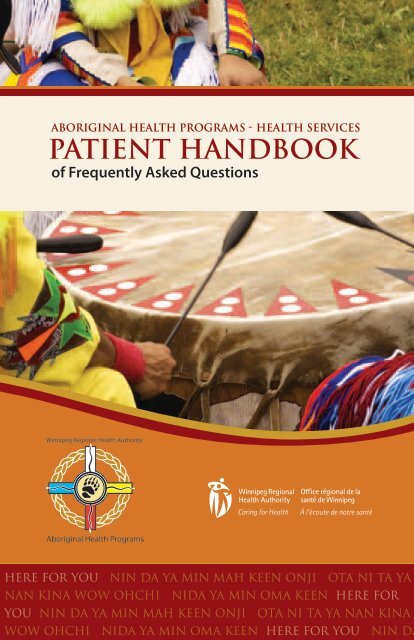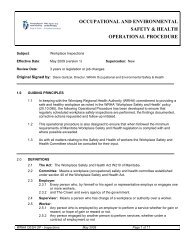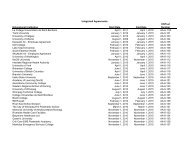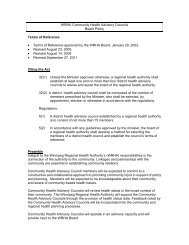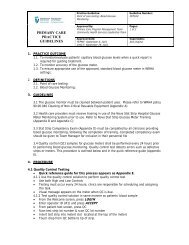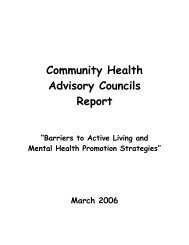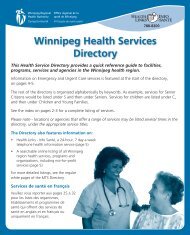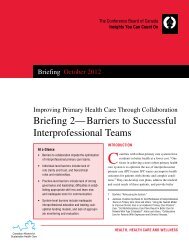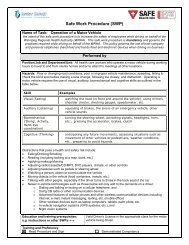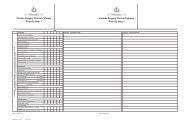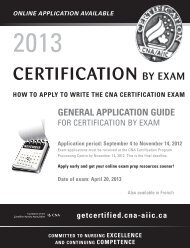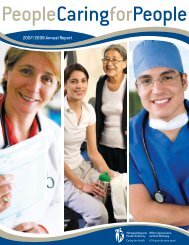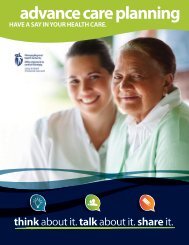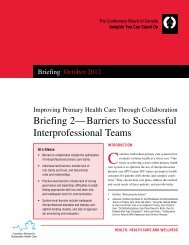Patient Handbook of Frequently Asked Questions - Winnipeg ...
Patient Handbook of Frequently Asked Questions - Winnipeg ...
Patient Handbook of Frequently Asked Questions - Winnipeg ...
- No tags were found...
You also want an ePaper? Increase the reach of your titles
YUMPU automatically turns print PDFs into web optimized ePapers that Google loves.
Aboriginal health Programs - Health Services<strong>Patient</strong> <strong>Handbook</strong><strong>of</strong> <strong>Frequently</strong> <strong>Asked</strong> <strong>Questions</strong>here for you Nin da ya min mah keen onji Ota ni ta yanan kina wow ohchi Nida Ya min oma keen here foryou Nin da ya min mah keen onji Ota ni ta ya nan kinawow ohchi Nida Ya min oma keen here for you Nin da
Table <strong>of</strong> ContentsWhat is Aboriginal Health Programs - Health Services..................... 2How to Contact Aboriginal Health Programs – Health Services.... 3Travel, Accommodations, Food and Clothing...................................... 6Medical............................................................................................................... 11Financial............................................................................................................. 16Legal Rights....................................................................................................... 171
What is Aboriginal Health Programs- Health Services?The <strong>Winnipeg</strong> Regional Health Authority’s Aboriginal Health Programs- Health Services focus on the delivery <strong>of</strong> appropriate, accessible andavailable health care for Aboriginal Peoples within the <strong>Winnipeg</strong>Health Region – this includes all <strong>of</strong> Manitoba and northwesternOntario. Aboriginal Peoples include First Nations, Métis, *Inuit, andnon-status individuals living in urban, rural, and remote communities.*Generally, Kivalliq Services will coordinate health services for Inuit clients.Aboriginal Health Programs and Kivalliq work in collaboration.Regional services within the <strong>Winnipeg</strong> Health Region and directservices within hospitals are available during regular working hours(Monday to Friday) and accessed by referral through Aboriginal HealthPrograms - Health Services Central Intake at 1-877-940-8880.Interpretation <strong>of</strong> medical terminology, physician instructions andhealth care related information is available in Swampy Cree, Ojibway/Saulteaux, and Oji-Cree/Island Lake Dialect. Assistance with dischargeplanning is available in complex situations, as is support and advocacyduring hospitalization or during some clinic visits as well. Familysupport during death or dying and various resources for spiritualneeds can be provided.2
How to Contact Aboriginal Health Programs– Health ServicesFor support from Aboriginal Health Programs - Health Services callCentral Intake at 940-8880 or toll free at 1-877-940-8880 and someonewill connect with you to discuss your needs.AHP - Health Services <strong>of</strong>fices are located in these <strong>Winnipeg</strong> HealthRegion facilities:Health Sciences Centre – room GH215 787-3427St. Boniface Hospital – room D2001 235-3393Seven Oaks Hospital – room 3A52 632-3441When at these facilities ask at the information desk and look for theAboriginal Health Programs symbol.Family rooms are also available at these locations. Ask any <strong>of</strong> theAHP – Health Services staff and they can show you where they arelocated.3
What number do I call after hours?Obtain information after hours by calling:Central Intake 1-877-940-8880Ekota Enterprises 983-0911Registered nurses are available to answer your questions 24 hoursa day, 7 days a week by calling Health Links – Info Santé at1-888-315-9257. You may also contact your local Nursing Station.Whom can I talk to if I do not understand?It is very important to understand the information provided by thehealth care team. Ask your doctor, nurse, or health care worker to callfor an Interpreter/Resource Worker to help you. Interpreter/ResourceWorkers who speak your language are available and happy to help inany way they can.5
Travel, Accommodations, Food and ClothingWhere can I stay in <strong>Winnipeg</strong>?You can stay with family or friends if they live within <strong>Winnipeg</strong> or at ahotel if you are paying your own way.Your Health Centre or Nursing Station community staff can usuallymake arrangements for you before leaving your community so youare not struggling at the last minute to find a place. If you are beingfunded by Non-Insured Health Benefits (Medical Services), First Nationsand Inuit Health will make your arrangements for one <strong>of</strong> theirauthorized boarding homes or hotels.First Nation and Inuit Health contracted boarding homes:Ekota Lodge – 561 St. Jean Baptiste, 233-3902Lennox Bell Lodge 60 Pearl St. 787-4271(this is near Health Sciences Centre)Nakiska Group – 395 Stradbrook Ave.452-0734 or284-3423Numa Health Centre – 390 Hampton St. 889-2490Swampy Cree Medical Receiving Home 477-0044415 River Ave.For Island Lake clients only – 929 College Ave., 582-9516For Norway House clients only – 333 Maryland St. 984-91226
Where can I find food?Many <strong>of</strong> the boarding homes <strong>of</strong>fer meals with the cost <strong>of</strong>accommodation. Your band may also be able to arrange for mealtickets while you are with your family in the hospital. It is best tomake these arrangements prior to leaving your community.Union Gospel Mission – 320 Princess St. 943-9904<strong>Winnipeg</strong> Harvest 982-3663Food Bank Appointment Line 982-3660Where can I find housing?Short-term housing options may be available within <strong>Winnipeg</strong> bycontacting the following:Dakota Ojibway First Nations Housing Authority100-11 Arden Ave. 985-4242Dakota Ojibway Tribal Council Housing Auth 988-5377300-340 Assiniboine Ave.Kanata Housing – 202-2055 McPhillips St.338-6261 or338-6327Ke-Ki-Nan Centre (Seniors) – 425 Elgin 582-0439Kinew Housing Inc. – 201-424 Logan Ave. 956-5093Marketplace – 1795 Henderson Hwy 334-4381Mother Of The Red Nations Women’s Council 942-6676300-141 Bannatyne Ave.If you are looking for permanent housing, the Interpreter/ResourceWorker will be able to connect you with local resources that can help you.Where can I find clothes?You may have been sent to the city without adequate clothing.Clothing depots in the hospitals have clothing for most ages.7
Be sure to let your Interpreter/Resource Worker know what you needso he/she can help you find what you are looking for or let you knowwhere to look. The Interpreter/Resource Worker will not be able toassist you outside the hospital facility but can connect you withresources.Salvation Army Thrift Store locations near hospitals:1030 Empress (Health Science Centre General Hospital) 772-205095 Sherbrook (Health Science Centre General Hospital) 772-9003145 Goulet (St. Boniface General Hospital) 233-78971050 Leila Blvd (Seven Oaks General Hospital) 586-2556180 Henry St. 946-9402When can I go home?Some people do not have medical services available to them that areclose to home. Until such time that your medical issues are resolvedit is important to be near treatment options – this may mean stayingin <strong>Winnipeg</strong> until you are medically and safely able to return home. Ifyou are registered First Nations, Non-Insured Health Benefits (MedicalServices) may support your stay in <strong>Winnipeg</strong> for medical treatment forthree to four months or by special arrangement if it is a bit longer.Why do I have to move/relocate?Some people are not able to return home because some medicalservices are not available in their communities. Talk to your health careprovider, the social worker, or your discharge planner and alwaysconnect with your Interpreter/ Resource Worker to help youunderstand the information presented about your relocation.Relocating to <strong>Winnipeg</strong> may be short-term until your medicalcondition improves or if your community gets the resources to meetyour medical needs. In this case, you will need to connect with yourhome community to make these arrangements for moving back home.8
Your band may be able to <strong>of</strong>fer you support for the move.If the relocation is considered permanent due to your medicalsituation, your band may be able to provide you with support in yourtransition to <strong>Winnipeg</strong>. The Interpreter/Resource Workers will not beable to assist you outside <strong>of</strong> the hospitals but will be able to provideyou with resources in <strong>Winnipeg</strong> that you can contact for supports.Why am I, or my loved one, being transferred elsewhere?The level <strong>of</strong> care you or your loved one requires may trigger a demandfor medical services that are not available where his/her care iscurrently being managed. This means you or your loved one will needto be transferred to another facility to receive appropriate care.Transfers may also occur out <strong>of</strong> <strong>Winnipeg</strong> to another regionalhospital closer to your home community. Discuss transfers with anInterpreter/Resource Worker present so all information is clearlyunderstood.How do I get back home?Many <strong>of</strong> the workers, such as social workers, discharge planners andInterpreter/Resource Workers, who can help you through discharge ortransfer, can also help you get home again. Once your level <strong>of</strong> care isstabilized and your care plan is reviewed with you and your family,hospital staff will be able to connect with Non-Insured Health Benefitsto make arrangements for you. Speak with these people about yourdischarge plan.If you have been sent out from a First Nation community, then thehealth care team will notify First Nation Inuit Health when you aremedically able to return home. If you became ill while visiting in<strong>Winnipeg</strong> you may be eligible for support from Non-Insured HealthBenefits. The Interpreter/Resource worker will be able to connect withNon-Insured Health Benefits to determine your eligibility for supportto get home.9
What if I require care for my children while I am in the hospital?If family members are not available, then agencies like Ma Mawi Wi ChiItata Centre have programming that is accessible and affordable. LocalChild and Family Services may be able to assist you as well for urgentand temporary situations.Ma Mawi Wi Chi Itata Centre363 McGregor St. 925-0340318 Anderson Ave. 925-0349443 Spence Ave. 925-0348What if I miss an appointment?There are some reasons for missing an appointment that areacceptable (such as admittance to a hospital or the weather is badso no flights are available). However, it is very important to attendall appointments when possible as you may have a long wait toreschedule another appointment.If your travel is being funded and you miss an appointment withouta logical or undeniable reason, you may lose your eligibility forcoverage. Your Health Centre or Nursing Station community staff canhelp you call your appointment location to let them know you are notable to make it. Connect with your funder as well to ensure you do notlose funding for future appointments.10
MedicalWhat can I bring to the hospital and will it be safe?You may bring personal items for your comfort such as a housecoat,slippers, toothbrush and toothpaste, hairbrush, and shampoo. You arealso welcome to bring sacred items such as your Bible, eagle feather,medicine pouch, or rosary, etc. The hospital will have special basketsthat you may put these items in so they will be safe. You may ask forone from the Interpreter/Resource Worker, from your nurse, or otherhealth care worker on your hospital ward. Upon discharge, you mayleave the basket on the bedside table. If you will be in an IsolationRoom, spiritual and personal items must be disposable; other items arenot allowed in the Isolation Room.After admittance to the hospital, it is wise to give your wallet andidentification to your family to take home until you need it whendischarged. If you are keeping more than $10.00 with you, please askyour nurse to lock it up in safekeeping. They will give you an envelope,mark your name on it, and give you a receipt. When being discharged,give the receipt to the nurse or ward clerk to get your money back.Please leave your jewelry at home.Can I see an Elder in the hospital?Aboriginal Health Programs – Health Services has Spiritual/CulturalCare Providers available to meet with you to discuss your needs andcan be contacted through Central Intake at 940-8880 or you can askyour Interpreter/Resource Worker. If requested, the Spiritual/CulturalCare Provider can assist you and your family with sacred spaces andceremonies. Services provided are free but traditionally tobacco is<strong>of</strong>fered to the Spiritual/Cultural Care Provider. Some hospitals havetheir own Spiritual/Cultural Care Providers on staff which AboriginalHealth Programs can connect you with if requested.11
How can I get an Elder to see me?If you wish to see a traditional or Christian Elder, you may ask theInterpreter/Resource Worker, nurse, doctor, or ward clerk for supportfinding someone for your spiritual needs. You are responsible for<strong>of</strong>fering the Elder tobacco and a gift, as usual. If you need a specifictraditional healer that is not in <strong>Winnipeg</strong>, you are responsible for his/her expenses unless you qualify for services under the First Nationsand Inuit Health policy for traditional healers (policy is available on theInternet at www.hc-sc.gc.ca/fniah-spnia/index-eng.php).Who can explain medical terms?It is sometimes hard to understand medical words the hospital staffuses. AHP - Health Services has Interpreter/Resource Workers availableto interpret the medical terms and help you understand them. TheInterpreter/Resource Workers are in the hospitals Monday to Friday,8:30 AM to 4:30 PM.What if I need medical equipment?If medical equipment is required, your occupational therapist assignedto your care team will begin the process <strong>of</strong> organizing the equipment.Hospital Social Work or the AHP - Health Services RegionalDischarge Planners may also participate in this process. The processmay include calling external agencies such as Non-insured HealthBenefits, Manitoba Public Insurance (985-7200), Employment IncomeAssistance, or Compensation for Victims <strong>of</strong> Crime. First Nations bandswill also assist with medical needs like equipment but may be limitedin what they can provide. Your Care Team in the hospital will reviewyour needs prior to discharge. Be sure to access your Interpreter/Resource Worker to help you understand what equipment your healthcare providers are requiring for your care.12
Where can I get Crisis Counselling?A guide to mental health resources for First Nations, Métis and Inuitpeople in <strong>Winnipeg</strong> is available by calling Central Intake at 940-8880or access The Culture <strong>of</strong> Well-Being Guide to Mental Health Serviceson our website at www.wrha.mb.ca/aboriginalhealth/files/MentalHealthGuide_Mar08.pdf.First Nations and Inuit Health (Non-Insured Health Benefits) providesaccess to crisis counselling for eligible First Nations and Inuit clients.After referral to a therapist, First Nations and Inuit Health will reviewthe treatment plan and may approve up to 12 visits to a therapist forcrisis counselling and support.For crisis services within <strong>Winnipeg</strong>, you or your family may contactthese services:Klinic (24 hour crisis line) 1-888-322-3019 or 786-8686Mobile Crisis Unit (24 hour crisis assessment) 940-1781Seneca House (short-term respite, peer support) 231-0217Seneca Help Line (7pm - 11pm) 942-9276* Emergency Psychiatric Services are also available at Victoria GeneralHospital, Seven Oaks Hospital, Grace Hospital, and St. Boniface Hospital.Who is covered under First Nations Inuit Health?First Nations individuals registered under the Indian Act and all infants(up to 12-months-old) born to First Nations are covered under the FirstNations & Inuit Health Non-insured Health Benefits Program (providingone parent has treaty status).If a person is working toward completing registration, she/he is notcovered until a treaty number has been approved and assigned.13
Who looks after people not covered under First Nations & InuitHealth?Those not covered by First Nations and Inuit Health may have ThirdParty Insurance, such as Blue Cross, Great West Life, Manitoba PublicInsurance, or Victims <strong>of</strong> Crime compensation.If no Third Party Insurance is available, individuals may look toprovincial assistance for coverage.Assistance may also be acquired through government-supportedagencies, such as Old Age Security, Pension, and Disability. Check withAboriginal Health Programs - Health Services at 940-8880 for support.Employment Income Assistance is available to individuals who areunemployed.How can I get my prescription filled?The hospital ward you are on can fax your prescription to a pharmacyand have it delivered to where you are staying. If you are released fromthe health care facility after-hours, ask the nurse or other health careprovider about 24-hour drug stores.The Health Sciences Centre has a pharmacy within the hospital andmost hospitals have pharmacies close-by. Grand Medicine is apharmacy that will deliver to fly-in communities.15
FinancialWho will pay for my transportation coverage?If the First Nation community health centre refers you then FirstNations Inuit Health (FNIH) will cover the cost <strong>of</strong> the trip. FNIHinformation is available through Ekota Enterprises at 983-0911.If you came out on your own, please connect with the AHP - HealthServices staff to determine whether you are eligible through Non-Insured Health Services. You may have to contact your local band <strong>of</strong>ficefor help with transportation, meals and accommodations.If you are on provincial assistance then you will have to contactServices To Other Regions at 945-5535 or 945-6599.Where can I get other funding support if something comes up?Your Interpreter/Resource Worker or a social worker can help identifythe resources that will best fit your situation.Where can I find money for an emergency?If you and your family require further support in an emergency,support may be available. Check with your Interpreter/ResourceWorker to assist you with supports, whether you live on or <strong>of</strong>f reserve.Your First Nations Band and Council may also be able to provideemergency funding.16
Legal RightsWho can help me fill out paperwork/applications?An Aboriginal Health Services Interpreter/Resource Worker is availableto assist you in understanding paperwork or applications. There are alsoSocial Workers in the hospitals to assist you.What are the papers they gave me to go home with?Do not leave the hospital or clinic if you do not understand the papersgiven to you. Ask the doctor, nurse, pharmacist, or health care workerto help you get an Interpreter/Resource Worker to come and help you.Where can I find a lawyer?Call 943-3602. This is a lawyer referral service, which can provide a list<strong>of</strong> lawyers. Aboriginal lawyers can be made available if you make thatrequest.The Aboriginal Law Centre at 416-294 Portage Avenue representsAboriginal people but the lawyers are not necessarily Aboriginal.You may be eligible for subsidized or funded legal services. You cancontact Legal Aid and Agazzi Legal Services at 985-5230.How do I make a will?Legal representation by a registered Notary Public or a lawyer is theonly recognized documentation. The health care workers are notauthorized to sign any legal documentation on your behalf or for yourfamily. The Interpreter/Resource Workers will help you in locatingsomeone that can assist you with your legal matters.17
What does a Public Trustee do? Who is that?A Public Trustee assists with financial, medical, and other personaldecision-making depending a person’s level <strong>of</strong> understanding orability to understand. The Public Trustee acts as Committee — thisis a legal term that says The Public Trustee must make financial andpersonal decisions for a person. When The Public Trustee is Committee,decisions may be made on behalf <strong>of</strong> a client including:• administering personal finances• giving consent to medical or psychiatric treatment• providing legal representation• making decisions about daily living on the person’s behalf• deciding where, and with whom, a person will live, eithertemporarily or permanentlyA Public Trustee can be assigned, depending on the nature ordynamics <strong>of</strong> a case. For further information on Public Trustees <strong>of</strong>Manitoba, go to www. gov.mb.ca/publictrusteeA Power <strong>of</strong> Attorney could be accessible; however, a person muststill have decision-making capacity in order to appoint someone as his/her Power <strong>of</strong> Attorney. This is different from a Public Trustee.18
Central Intake 1-877-940-8880Guide to Health and Social Servicesfor Aboriginal People in Manitoba:www.wrha.mb.ca/aboriginalhealth/files/AHSGuide.pdfhere for you Nin da ya min mah keen onji Ota ni ta yanan kina wow ohchi Nida Ya min oma keen here foryou Nin da ya min mah keen onji Ota ni ta ya nan kinawow ohchi Nida Ya min oma keen here for you Nin da


